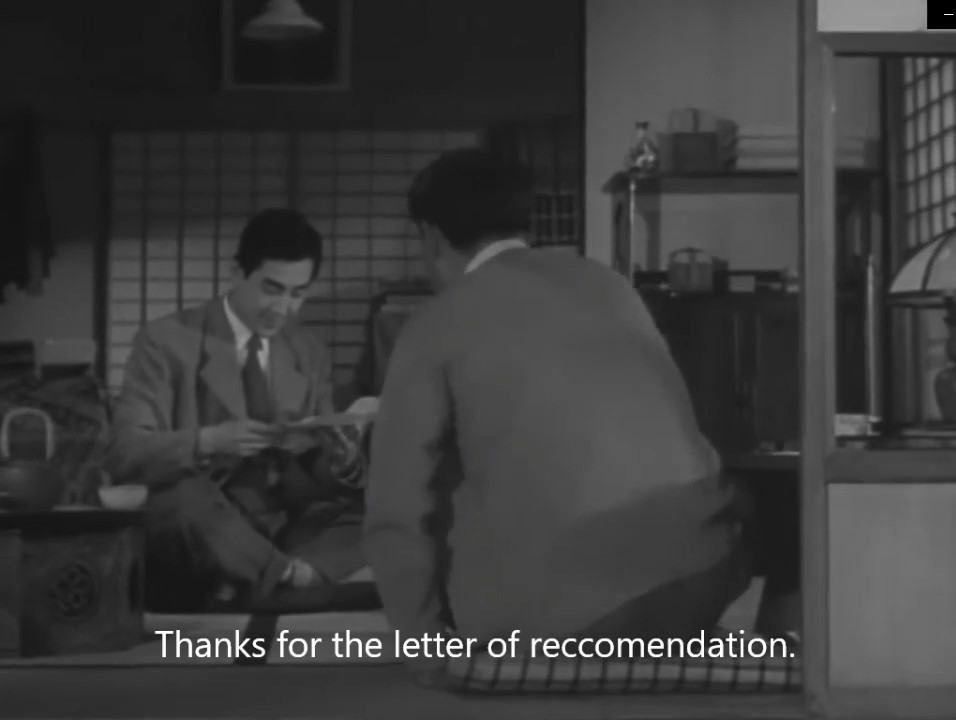
Men at home
What is more interesting, watching bike races or playing pachinko?
お茶漬の味
The tast of green tea over rice

What is more interesting, watching bike races or playing pachinko?

The women can enjoy their trip because they lied to their husbands.
Title: The taste of green tea over rice
Original title: お茶漬の味 Ochazuke no Aji
Published: 1952
Length: 115 minutes
Staff
Director: Yasujirō Ozu
Script: Kōgo Noda, Yasujirō Ozu
Music: Ichirō Saitō
Cast
Shin Saburi : Mokichi Satake
Michiyo Kogure: Taeko Satake
Kōji Tsuruta: Non-chan / Noboru Okada
Ryū Chishū: Sadao Hirayama
Chikage Awashima: Aya Amamiya
Keiko Tsushima: Setsuko Yamauchi
Kuniko Miyake: Chizu Yamauchi
Eijirō Yanagi: Naosuke Yamauchi
Taeko and Mokichi Satake are a childless couple living in Tokyo. As a department manager in a company, he is responsible for technical products, while she does not have to work.
The film offers an interesting insight into Japan in the early 1950s. It is about the topic of arranged marriages and what then becomes of them in everyday life. The film shows the emotional state of the people involved in calm and sensitive images.
When Taeko and Mokichi talk openly to each other, they also find a solution how they can live well together.

The song that the women sing in a cheerful group, "Sumire no hana saku koro", is the Japanese version of "On a Day in Spring". The song was composed in 1929 by Franz Doelle (1883-1965) and made popular by the 1933 German film "Viktor und Viktoria", where ist was sung by Renate Müller. The story has been remade several times in other languages, as for example as "George et Georgette" in French. A well-known version is the one from 1982 with Julie Andrews.
The Japanese text was written by Tetsuzo Shirai (1900-1983), the famous director of the Takarazuka Revue. By the shows of the Takarazuka Revue the song became very popular in Japan.
春すみれ咲き春を告げる - 春何ゆえ人は汝(なれ)を待つ - 楽しく悩ましき春の夢甘き恋 - 人の心酔わすそは汝 - すみれ咲く春。
Haru sumire saki haru o tsugeru - haru nanyue hito wa nanji o matsu - tanoshiku nayamashiki haru no yume amaki koi - hito no shinsui wa suso wa nanji - sumire saku haru.
すみれの花咲くころ - はじめて君を知りぬ - 君を想い日ごと夜ごと - 悩みしあの日のころ。
Sumire no hana saku koro - hajimete kimi o shirinu - kimi wo omoi bi goto yoru goto - nayami shi ano nitsu no koro
すみれの花咲くころ - 今も心ふるう - 忘れな君 われらの恋 - すみれの花咲くころ。
Sumire no hana saku koro - ima mo kokoro furuu - wasurena kimi warera no koi - sumire no hana saku koro
When the spring violets bloom, they announce the coming of spring - Why do people wait for spring? - A joyful and restless dream of sweet love in spring - It makes people fall in love - Spring when the violets bloom.
When the violets were blooming - That's when I first knew you -
I think about you day and night - These were days when I become flustered.
When the violets are blooming - Now my heart still quivers - You whom I've forgotten, we were in love - It’s the time when violets are blooming.
Originale Version by Bruno Balz/Franz Doelle.
Glücklich wie niemals im Leben - Was kann es Schöneres geben- als einmal ganz ohne Wunsch zu sein
Alles ist heute so heiter - Das Glück hilft uns nun weiter - Es stellt sich bei jedem einmal ein!
An einem Tag im Frühling - klopft das Glück an deine Tür - und die Welt erstrahlt im goldnen Schein.
Dann reich dem Glück die Hände - Laß es nie mehr fort von dir - Und es kehrt für immer bei dir ein.
Für jeden kommt die Stunde - wo ihm die Sonne lacht - und wo Fortuna endlich - mal winke, winke macht.
An einem Tag im Frühling - klopft das Glück an deine Tür - und den schönsten Traum erfüllt es dir.
Glücklich wie niemals im Leben - Was kann es Schöneres geben - als einmal ganz ohne Wunsch zu sein.
Alles ist heute so heiter - Das Glück hilft uns nun weiter - Es stellt sich bei jedem einmal ein!